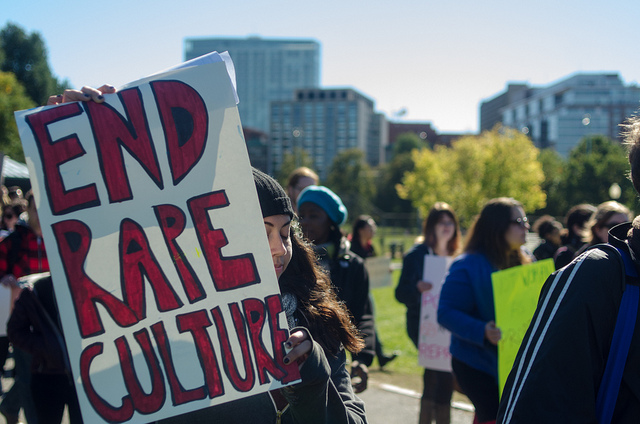Recently, with the rise of social media and slang that makes absolutely no sense, the casual usage of the word “rape” is becoming more and more frequent.
More often than not, rape is associated with positivity and accomplishment and is used as a synonym for “won” or “achieved.”
“Xyz football club raped abc football club.” (Translation: xyz football club won.)
“I raped the math test.” (Translation: I did really well on the math test.)
“I got raped at work today.” (Translation: I had heaps of work today.)
Usually, it is men who are heard saying such things. Most of the time, it comes from good, respectable men who mean no harm. They don’t condone rape. They may even step in and stop rape if they see it happening.
These men are my coworkers, my friends and my colleagues—people I respect and, sometimes, admire.
So every time they use “rape” as just another verb, I’m left wondering whether I should speak up or not. Normally, I don’t waste a second stepping in and putting an end to any injustice taking place. So I fail to understand why this should be any different.
Well, it’s because it’s a difficult concept to explain.
The casual usage of “rape” as just another verb reflects society’s lax attitude toward the crime.
Consciously or unconsciously, rape jokes trivialize and legitimize it.
So let’s talk about whether it is ever okay to use the word “rape” out of context. That is, is it ever okay to use the word “rape” to describe anything other than forcible sexual intercourse without consent?
Of course, I don’t believe so.
To begin with, it is incredibly triggering for a rape victim every time they hear the crime being trivialized.
I have met victims of rape. I’ve heard and written their stories. And every time, I wanted nothing more than to erase their memory of the terrible crime. To think that someone might be in the privileged position of laughing at their survival is shocking, to say the least.
You never know who may be a rape survivor. It can be your friend, your sister, your colleague or your teacher. We know no one’s story.
Furthermore, rape jokes validate rapists. Every time a rapist hears a rape joke, he will think that there is nothing inherently wrong with what he did. Some rapists don’t even know that what they did is a crime. They don’t understand that having sex with someone who is drunk beyond the point of consent or otherwise out of their senses is not sex—it’s rape.
Rapists thrive in situations where their behavior is associated with victory and achievement. Then again, you don’t know who may be a rapist. It can be your friend, your colleague or your teacher.
Children who hear rape jokes grow up believing that it is okay to joke about it. I’ve heard subtle rape jokes in cartoons like Spongebob, which is, frankly, very disturbing. It’s no surprise that we hear children as young as 10 casually throwing around that word, too.
Eventually, it can turn into children believing that since it is okay to joke about rape, it is not a big deal and the plight of rape victims isn’t something terrible beyond imagination. And if we’re raising a generation with this mentality, it is not okay.
Most importantly, the problem is that rape jokes and rape culture are only at the expense of the rape victims. I’m all for comedy shedding light on social issues. But there is a visible line between rape jokes at the expense of the victim and ones at the expense of the rapist. One humiliates and degrades survivors of a terrible ordeal, and the other points to the problem. There is a huge difference. Know that difference.
On moral grounds, anyone should be able to see that there is something terribly wrong in associating rape with positivity, even if they don’t understand why it’s so terribly wrong.
This is not a violation of your free speech rights. By all means, say whatever you wish to say. But we live in a time where religious leaders have become rape apologists and politicians encourage women to dress modestly so they won’t be raped. Victim blaming happens everywhere. Advertisements have disturbing methods of showing violence and bondage to sell their products.
If we cannot stand up to even one aspect that perpetuates rape culture, we are part of the problem.
So I encourage everyone to not make light of such a serious topic. Don’t use “rape” as a verb. The world is full of interesting and exotic vocabulary. That pretty much makes the use of the word “rape” out of context unnecessary, and just a reflection of the mentality of the user.
Most difficult of all, speak up when someone else uses “rape” out of context.
Rape culture builds upon these seemingly insignificant issues. Don’t aid the building blocks.
~
Relephant Read:
Enough is Enough: Zero Tolerance for Rape Culture on Facebook. {Trigger Warning: Disturbing Material}
~
Author: Aqsa Sajjad
Editor: Toby Israel
Image: Chase Carter/Flickr // Richard Potts/Flickr
~







Read 3 comments and reply